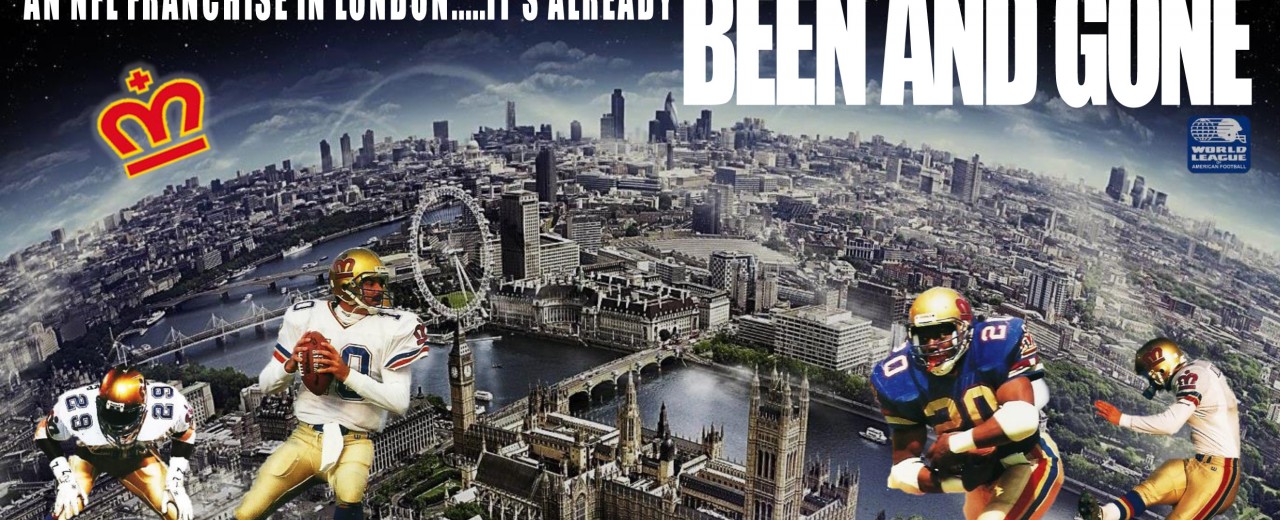Been And Gone

There has been intense speculation for a while now regarding the NFL’s plans to put a permanent franchise in London. With the continued popularity of the International series games, the talk is that it is only a matter of time before the league expands, and takes up residence in the capital. To gauge the likelihood of it happening, let’s jump into the FAUK DeLorean and slide back thirty years.
It was 1987, and the NFL were keeping a stealthy eye on the development of football in Britain, they could see a market for their game and were eager to explore the opportunity to expose and expand the sport internationally. Commissioner Pete Rozelle, along with owners Dan Rooney and Lamar Hunt were the driving forces behind the idea of an international league, and after some heavy lobbying amongst the team owners, the project got the green light.
There had been alternative Pro leagues in the states before, the most notable being the United States Football League. Formed in 1983, its strength had been the geographic spread of teams and the fact that they had tempted big name college players to sign for them in favour of the NFL. Its season ran in the spring, and the TV networks were eager to provide hungry football fans with the chance to watch their sport year round, it also gave them an additional revenue stream. The USFL had sued the NFL, claiming that they had a monopoly on football in the US. The court found in favour of the USFL, but only awarded them $3.76. The fledgling league went bankrupt, but the case had made the NFL aware that there was demand for a spring league, and they wanted to find a way to meet it. Their legal advisers confirmed that if the new league only featured teams based in the states, they would be breaking anti-trust laws, leading to the conclusion that they would have to include overseas teams. The World League of American Football was formed, featuring six teams based in the states, one in Canada and three in Europe, one of those being The London Monarchs.

The World League worked well as a vehicle to further the game, it ticked all the boxes. It gave the sport greater international exposure, it gave the NFL teams the opportunity to place their developing players in a competitive environment, additional TV revenue would be generated, and crucially from a European standpoint, a select group of talented “National” players would have the opportunity to perform at the professional level. A combine was held in Florida where the WLAF coaches and general managers attended to assess the players that the NFL teams had agreed to “loan” to the league, along with the many free agents who were on the bubble of playing pro. Separate try-outs were held in England, Spain and Germany to find the national players for the Monarchs, Barcelona Dragons and Frankfurt Galaxy. In London, the league’s marketing team went into overdrive to raise the profile of the team. They made overtures to British Rugby League legend Ellery Hanley to see if he would be interested in playing, the press ate it up. Hanley never signed, but now the public knew all about the Monarchs. With the planning completed and the logistics for all the teams now in place, the League was set for its first season, which kicked off on March 23 1991. The Monarchs travelled to Frankfurt to play in the inaugural game of the league, and fittingly on the opening kick-off, British stand-out Victor Ebubedike made the league’s first ever tackle. They won the game 24-11. Head coach Larry Kennan had made some astute selections at the draft, and it soon became apparent that the Monarchs were stacked with talent and one of the favourites to make the “World Bowl” championship game. London were the team to beat, but nobody managed to get the better of them until the last game of the regular season, when the Barcelona Dragons edged them 20-17. This was a wake-up call for the Monarchs who would travel to New York to play the Knights in the play-off semi-final. After a slow start they rallied to win 28-20, clinching their place in the World Bowl against Barcelona, with the game to be played at Wembley, all was set for a spectacular climax to the season. On the 6th of June 1991 over 60,000 fans crammed into the stadium to watch a thrilling encounter. The Monarchs dominated throughout and won 21-0. The fans and players celebrated long into the night, the League had been a spectacular success, surely the foundations were set for the WLAF to become a permanent addition to the global sporting landscape.

After the euphoria had died down, the leagues bean counters performed their financial forensics. Despite all the positivity around playing standards and TV deals, the league had made a loss. The European teams had been well supported, but the American outfits, less so. After much debate amongst the owners, it was decided to carry on with the experiment, and the 1992 season was to go ahead. What transpired over the season though effectively sealed its fate. Attendances and general interest dropped, along with the level of success the Monarchs were having. The expected profits and (with a few exceptions) NFL calibre players hadn’t materialised and the League was put “on ice” for a year, whilst the executives decided what to do. The proposed one-year break got stretched to three, but when the League re-appeared in 1995 it was a new beast. The American teams had gone, and the new structure featured only European based franchises, hence it was now called NFL Europe. The Monarchs were back and were joined in Britain by the Scottish Claymores. Over the next four years the League toiled in earnest to repeat their early success, bringing in some veteran NFL players, moving games around the country and even changing the team’s name to the England Monarchs (shouldn’t that be the English Monarchs?), but it didn’t work, and in 1998 the London franchise ceased to exist. The League itself continued for another seven years, finally closing down in 2007. By that point, it was effectively a five team German league, with an off-shoot outfit in Holland. Commissioner Roger Goodall confirmed that the reason for the cancellation of operations was the same as at the end of that first 1991 season, the operation was losing a sizeable amount of money.

So with that in mind, what chance is there of an NFL franchise being in London? Next to none, I would say. Why go to all the logistical trouble and cost of setting up a permanent team. The current International Series games (four per season) can fill a London stadium with fans of all teams, anxious to see regular season games. If “their team” are playing, that’s the icing on the cake. The majority of UK fans already have a strong attachment to an existing NFL team, would they change their allegiance? The participating clubs get to have their bye weeks straight after the games. Players and coaches aren’t away from their families for the duration of a full season. There are no weekly issues for players changing time zones. The current league structure is perfectly symmetrical, why give yourself the headache of one extra team?
As Goodall has said, the NFL will use “new technologies to make the NFL more popular worldwide”. What would make them even more popular in the UK, would be if they used some of the dollars they’ll be saving, to support the development of our domestic game.



